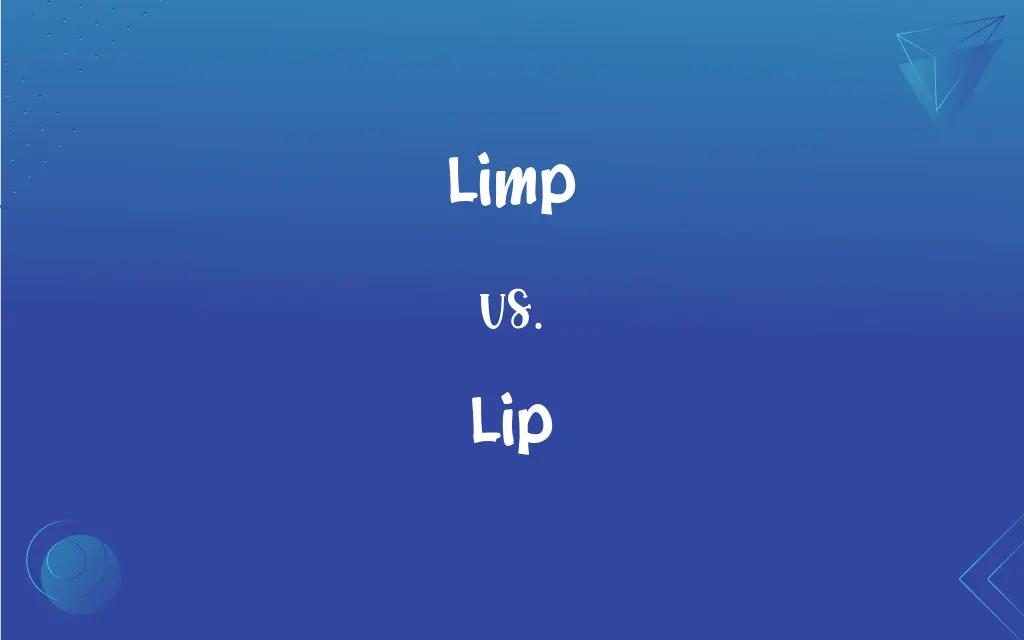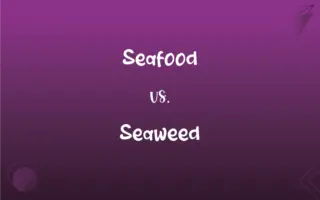Limp vs. Lip: What's the Difference?
By Aimie Carlson || Updated on May 24, 2024
Limp describes a lack of firmness or stiffness, often indicating weakness or floppiness, while lip refers to the edge of the mouth or any structure resembling this edge. Limp is an adjective or verb, whereas lip is a noun.

Key Differences
Limp refers to something that is soft, flabby, or not firm. It can describe an object, such as a limp piece of lettuce, or a person’s movement, such as walking with a limp due to injury. Limp conveys a sense of weakness or lack of rigidity. Lip, in contrast, is a noun that denotes the fleshy edges that form the opening of the mouth. Lips are essential for speech, eating, and expressions. The term can also describe the edge of a container or any similar structure, like the lip of a cup.
Limp, as an adjective, describes the physical state of something lacking firmness. As a verb, it describes the act of walking unevenly due to injury or weakness. Lip, however, always serves as a noun, referring to a part of the mouth or an edge.
Limp implies a deficiency in strength or support. For instance, a plant may become limp without water. Lip, on the other hand, has more anatomical and structural connotations, such as using lip balm to moisturize or the lip of a plate.
Limp and lip are unrelated in meaning and usage but are phonetically similar, which can cause confusion. Limp relates to physical state and movement, while lip pertains to anatomical features and edges.
Comparison Chart
Definition
Lacking firmness or stiffness; to walk unevenly
Fleshy edges of the mouth; edge of a container
ADVERTISEMENT
Part of Speech
Adjective, Verb
Noun
Usage Example
The flower became limp without water.
She applied lip balm to her chapped lips.
Related to
Physical state or movement
Anatomical features or edges
Context
Weakness, floppiness
Mouth, containers
Limp and Lip Definitions
Limp
Lacking firmness or stiffness.
The celery was limp after being left out of the fridge.
ADVERTISEMENT
Lip
The fleshy edges surrounding the mouth.
She smiled, revealing her full lips.
Limp
Weak or flabby in texture.
His handshake was limp and unimpressive.
Lip
An edge or rim of a container or object.
The cup had a small chip on its lip.
Limp
To walk with difficulty due to injury or weakness.
She had to limp back home after twisting her ankle.
Lip
Either of two fleshy structures that surround the opening of the mouth in humans and other mammals.
Limp
To move or proceed haltingly or unsteadily.
The old dog limped across the yard.
Lip
In humans, the smooth brownish to reddish border of the lip.
Limp
To walk lamely, especially with irregularity, as if favoring one leg.
Lip
(Anatomy) A labium.
Limp
To move or proceed haltingly or unsteadily
The project limped along with half its previous funding.
Lip
The margin of flesh around a wound.
Limp
An irregular, jerky, or awkward gait.
Lip
Either of the margins of the aperture of a gastropod shell.
Limp
Lacking or having lost rigidity, as of structure or substance
Limp, wet hair.
An arm hanging limp over the side of the bed.
Lip
A rim, as of a vessel, bell, or crater.
Limp
Lacking strength, vigor, or effectiveness; weak
Limp political opposition.
Lip
(Botany) One of the two divisions of a bilabiate corolla or calyx, as in the snapdragon, or the modified median petal of an orchid flower.
Limp
(intransitive) To walk lamely, as if favouring one leg.
Lip
The tip of a pouring spout, as on a pitcher.
Limp
To travel with a malfunctioning system of propulsion.
The bomber limped home on one engine.
Lip
(Slang) Insolent talk.
Limp
To move or proceed irregularly.
Limping verses
The business limped through the recession
Lip
To touch the lips to.
Limp
To call, particularly in an unraised pot pre-flop.
Lip
To utter.
Limp
To be inadequate or unsatisfactory.
Lip
To lap or splash against.
Limp
To happen; befall; chance.
Lip
(Sports) To hit a golf ball so that it touches the edge of (the hole) without dropping in.
Limp
To come upon; meet.
Lip
(countable) Either of the two fleshy protrusions around the opening of the mouth.
Limp
An irregular, jerky or awkward gait.
She walks with a limp.
Lip
(countable) A part of the body that resembles a lip, such as the edge of a wound or the labia.
Limp
A scraper for removing poor ore or refuse from the sieve.
Lip
The projecting rim of an open container; a short open spout.
Limp
A scraper of board or sheet-iron shaped like half the head of a small cask, used for scraping the ore off the sieve in the operation of hand-jigging.
Lip
Backtalk; verbal impertinence.
Don’t give me any lip!
Limp
Flaccid; flabby, like flesh.
Lip
The edge of a high spot of land.
Limp
Lacking stiffness; flimsy
Lip
The sharp cutting edge on the end of an auger.
Limp
(of a penis) not erect
Lip
(botany) One of the two opposite divisions of a labiate corolla.
Limp
(of a man) not having an erect penis
Lip
(botany) The distinctive petal of the Orchis family.
Limp
Physically weak
Lip
(zoology) One of the edges of the aperture of a univalve shell.
Limp
To halt; to walk lamely. Also used figuratively.
Lip
Embouchure: the condition or strength of a wind instrumentalist's lips.
Limp
A halt; the act of limping.
Lip
(transitive) To touch or grasp with the lips; to kiss; to lap the lips against (something).
Limp
A scraper for removing poor ore or refuse from the sieve.
Lip
(of something inanimate) To touch lightly.
Limp
Flaccid; flabby, as flesh.
Lip
To wash against a surface, lap.
Limp
Lacking stiffness; flimsy; as, a limp cravat.
Lip
(intransitive) To rise or flow up to or over the edge of something.
Limp
The uneven manner of walking that results from an injured leg
Lip
(transitive) To form the rim, edge or margin of something.
Limp
Walk impeded by some physical limitation or injury;
The old woman hobbles down to the store every day
Lip
(transitive) To utter verbally.
Limp
Proceed slowly or with difficulty;
The boat limped into the harbor
Lip
(transitive) To simulate speech by moving the lips without making any sound; to mouth.
Limp
Lacking in strength or firmness or resilience;
Flaccid muscles
Took his lax hand in hers
Gave a limp handshake
A limp gesture as if waving away all desire to know
A slack grip
Lip
(sports) To make a golf ball hit the lip of the cup, without dropping in.
Limp
Not firm;
Wilted lettuce
Lip
To change the sound of (a musical note played on a wind instrument) by moving or tensing the lips.
Limp
Not stiff or firm.
The flag hung limp without any wind.
Lip
One of the two fleshy folds which surround the orifice of the mouth in man and many other animals. In man the lips are organs of speech essential to certain articulations. Hence, by a figure they denote the mouth, or all the organs of speech, and sometimes speech itself.
Thine own lips testify against thee.
Lip
An edge of an opening; a thin projecting part of anything; a kind of short open spout; as, the lip of a vessel.
Lip
The sharp cutting edge on the end of an auger.
Lip
One of the two opposite divisions of a labiate corolla.
Lip
One of the edges of the aperture of a univalve shell.
Lip
Impudent or abusive talk; as, don't give me any of your lip.
Lip
To touch with the lips; to put the lips to; hence, to kiss.
The bubble on the wine which breaksBefore you lip the glass.
A hand that kingsHave lipped and trembled kissing.
Lip
To utter; to speak.
Lip
To clip; to trim.
Lip
Fleshy folds of tissue as those surrounding the mouth
Lip
An impudent or insolent rejoinder;
Don't give me any of your sass
Lip
The top edge of a vessel
Lip
The edge of a wound or opening.
The surgeon carefully stitched the lip of the incision.
Lip
The outer part of a structure resembling a lip.
The lip of the volcano was covered in snow.
Lip
The part of the mouth used in speech and expression.
He bit his lip nervously during the interview.
FAQs
Can lip be used as a verb?
No, lip is typically used as a noun.
What does lip mean?
Lip refers to the fleshy edges of the mouth or the edge of a container.
Is lip always anatomical?
No, lip can also refer to the edge of a container or object.
Can limp describe objects?
Yes, limp can describe objects that lack firmness, like a limp piece of lettuce.
Can lip describe non-human things?
Yes, lip can describe the edge of a container, like the lip of a cup.
What does limp mean?
Limp means lacking firmness or stiffness, or walking unevenly due to weakness.
Can limp be a verb?
Yes, limp can be a verb meaning to walk with difficulty due to injury or weakness.
Is limp always negative?
Limp generally has a negative connotation, implying weakness or lack of rigidity.
What part of speech is lip?
Lip is a noun.
Does limp have a medical implication?
Yes, limp can refer to an uneven gait due to injury or medical conditions.
What part of speech is limp?
Limp can be an adjective or a verb.
Can lip refer to anything other than the mouth?
Yes, lip can refer to any edge or rim, such as the lip of a jar.
What is an example of lip in a non-anatomical context?
An example is, "The lip of the crater was jagged and steep."
Can limp be used figuratively?
Yes, limp can be used figuratively to describe something lacking vitality or energy.
Can lip be used figuratively?
Yes, lip can be used in phrases like "giving lip," meaning to talk back.
How can limp describe a person's movement?
Limp describes a person's movement when they walk unevenly due to an injury.
Is limp related to strength?
Limp often implies a lack of strength or support.
What is an example of limp as a verb?
An example is, "After the injury, he had to limp home."
How is lip used in everyday language?
Lip is commonly used to refer to the mouth area, like in "She has chapped lips."
Is lip related to structure?
Yes, lip relates to the anatomical structure of the mouth or the edge of objects.
About Author
Written by
Aimie CarlsonAimie Carlson, holding a master's degree in English literature, is a fervent English language enthusiast. She lends her writing talents to Difference Wiki, a prominent website that specializes in comparisons, offering readers insightful analyses that both captivate and inform.































































